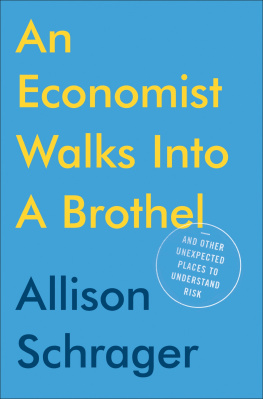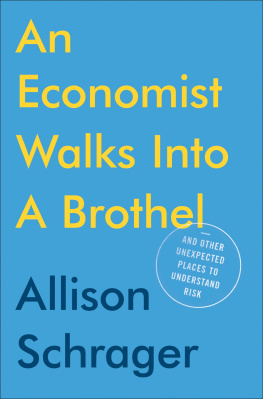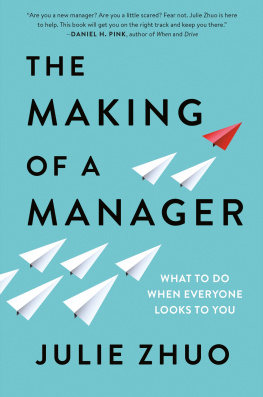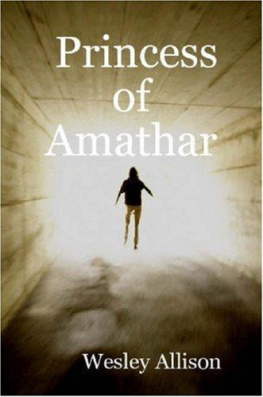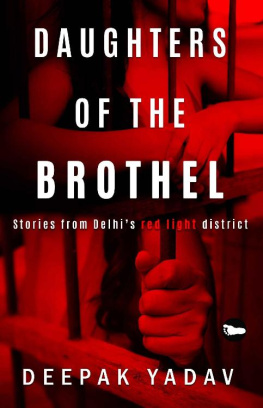Allison Schrager - An Economist Walks into a Brothel
Here you can read online Allison Schrager - An Economist Walks into a Brothel full text of the book (entire story) in english for free. Download pdf and epub, get meaning, cover and reviews about this ebook. year: 0, genre: Business. Description of the work, (preface) as well as reviews are available. Best literature library LitArk.com created for fans of good reading and offers a wide selection of genres:
Romance novel
Science fiction
Adventure
Detective
Science
History
Home and family
Prose
Art
Politics
Computer
Non-fiction
Religion
Business
Children
Humor
Choose a favorite category and find really read worthwhile books. Enjoy immersion in the world of imagination, feel the emotions of the characters or learn something new for yourself, make an fascinating discovery.
- Book:An Economist Walks into a Brothel
- Author:
- Genre:
- Year:0
- Rating:3 / 5
- Favourites:Add to favourites
- Your mark:
- 60
- 1
- 2
- 3
- 4
- 5
An Economist Walks into a Brothel: summary, description and annotation
We offer to read an annotation, description, summary or preface (depends on what the author of the book "An Economist Walks into a Brothel" wrote himself). If you haven't found the necessary information about the book — write in the comments, we will try to find it.
An Economist Walks into a Brothel — read online for free the complete book (whole text) full work
Below is the text of the book, divided by pages. System saving the place of the last page read, allows you to conveniently read the book "An Economist Walks into a Brothel" online for free, without having to search again every time where you left off. Put a bookmark, and you can go to the page where you finished reading at any time.
Font size:
Interval:
Bookmark:
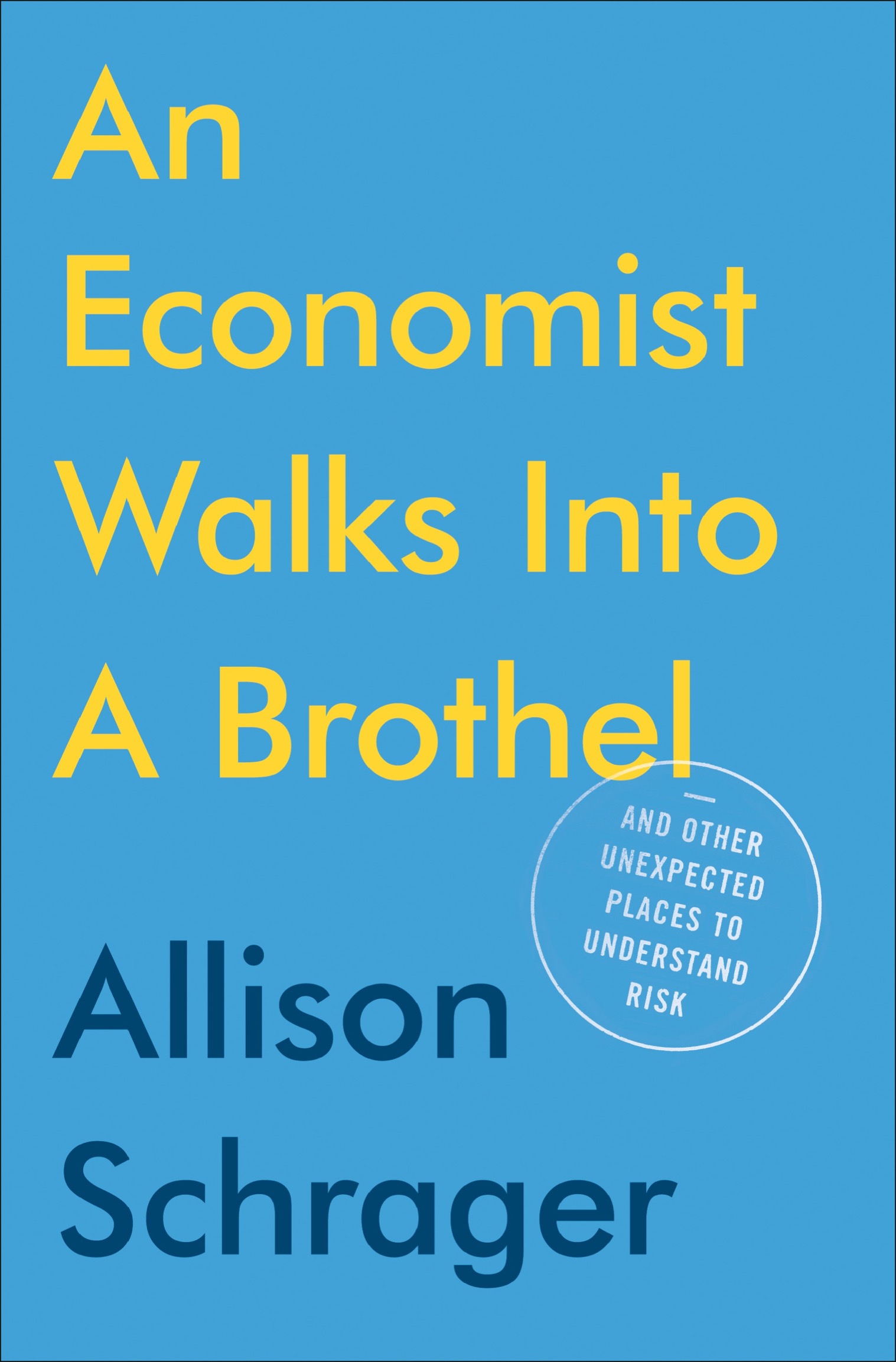
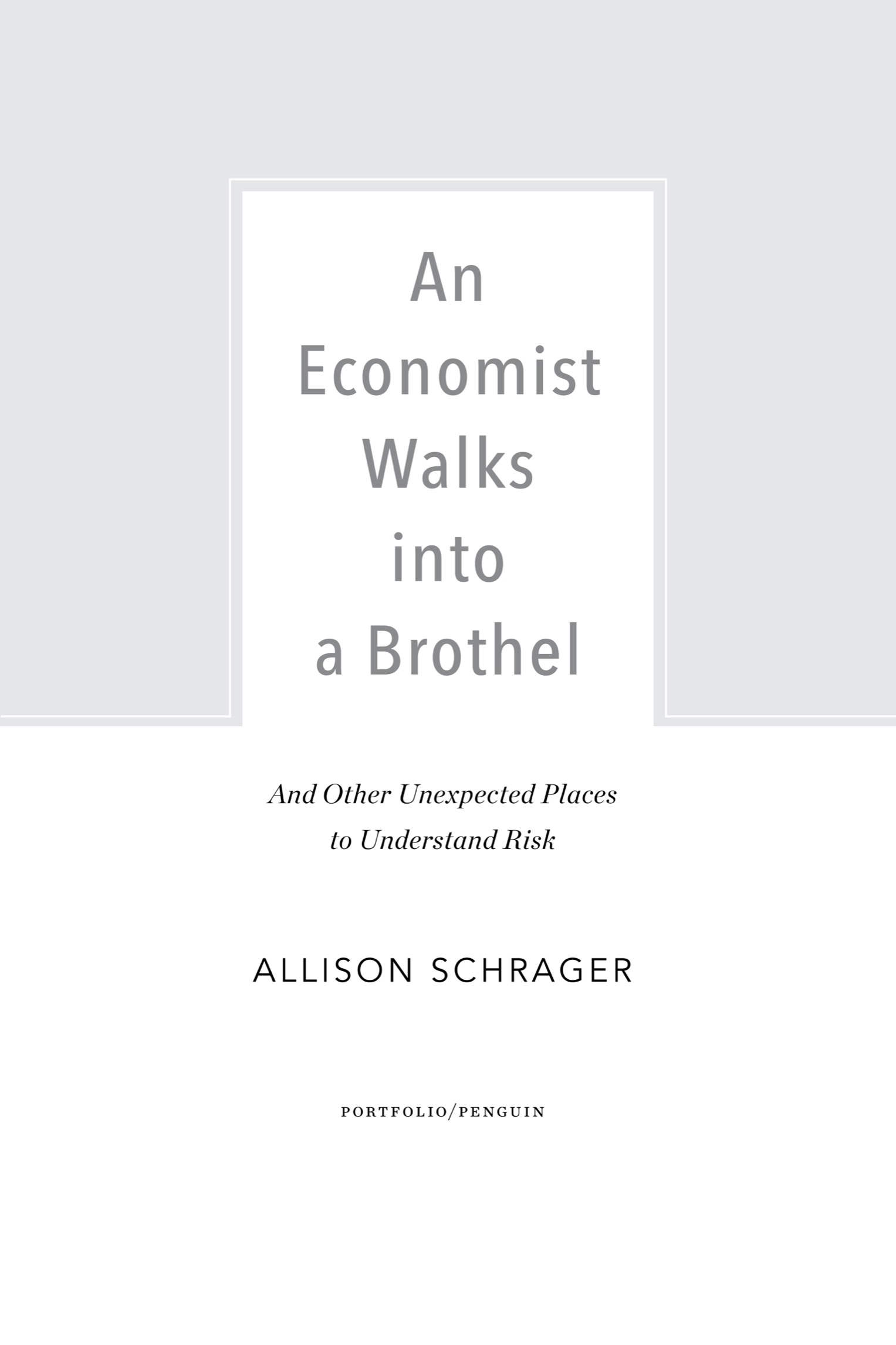

Portfolio/Penguin
An imprint of Penguin Random House LLC
penguinrandomhouse.com

Copyright 2019 by Allison Schrager
Penguin supports copyright. Copyright fuels creativity, encourages diverse voices, promotes free speech, and creates a vibrant culture. Thank you for buying an authorized edition of this book and for complying with copyright laws by not reproducing, scanning, or distributing any part of it in any form without permission. You are supporting writers and allowing Penguin to continue to publish books for every reader.
ISBN 9780525533962 (hardcover)
ISBN 9780525533979 (ebook)
ISBN 9780525542827 (international edition)
Penguin is committed to publishing works of quality and integrity. In that spirit, we are proud to offer this book to our readers; however, the story, the experiences, and the words are the authors alone.
While the author has made every effort to provide accurate internet addresses and other contact information at the time of publication, neither the publisher nor the author assumes any responsibility for errors or for changes that occur after publication. Further, the publisher does not have any control over and does not assume any responsibility for author or third-party websites or their content.
Version_2
The revolutionary idea that defines the boundary between modern times and the past is the mastery of risk: the notion that the future is more than a whim of the gods and that men and women are not passive before nature.
PETER BERNSTEIN, AGAINST THE GODS
Despite the bright Nevada sun, the room was dark and the air stuffy; an obscure I Love Lucy rerun played on mute. A bell rang and a nondescript, pudgy man entered. Suddenly about a dozen women came running from a maze of long hallways, whooshed past me, and lined up in the foyer. Each woman folded her hands behind her back, stepped forward, and said her name. The man pointed to the second woman on the left, a zaftig platinum blonde wearing a red thong and lace bra. She took his hand and led him to her room.
Welcome to the Moonlite BunnyRanch. A legal brothel is perhaps not where you would expect to find an economist who specializes in retirement finance, but Im an unusual kind of risk junkie. I hunt risk to understand it better. I dont seek out adrenaline-charged situations. Ive never bungee jumped, I dont ski, and I may be the only New Yorker who is afraid to jaywalk. Rather than look for risky situations for the rush of defying the odds, I search for unusual places that can teach me more about risk and how to manage it.
I was trained to shape policy, advise captains of industry, or write research papers at a university. And yet there I was, sitting on a red velvet sofa in a vinyl-sided house in a remote corner of Nevada because unusual markets like sex work thrive on risk. We can always find better ways to measure and reduce risk, so I go wherever people might be defying the odds. After all, financing retirement when you dont know if the stock market will soar or crash, or how long you will live, requires mastering risk.
Sex work is a risky business. I went to Nevada to understand how the industry isolates and assigns a price to this risk. Most sex workers and their clients could be arrested or subject to violence. Sex workers who find their customers on the streets are thirteen times more likely to be murdered than the general population. Thirty-five percent of sex-worker homicides are committed by serial killers. Paying for or selling sex carries a stigma: sex workers and their customers face social, professional, and legal repercussions if they are caught. I went to the brothel to understand what it costs to eliminate this risk.
When people hear the word risk, they automatically think of something terrible, the worst-case scenario, like losing their job, their wealth, or their spouse.
But we need to take risks to make our lives better. We must gamble to get what we want, even if it comes with the possibility of loss. If we want a great relationship, we risk heartbreak. If we want to get ahead at work, we have to volunteer for projects that we might fail at. If we avoid risk, our lives wont move forward. Technically, risk describes everything that might happenboth good and badand how probable each of these outcomes is.
Even the history of the word risk illustrates our complicated feelings about the concept: it derives from rhizikn, an ancient Greek seafaring term that describes a dangerous hazard. Though its usage evolved slightly over the years, it always described something perilous. But the meaning changed in the sixteenth century, when exploration of the New World began, and people started to think about risk as something controllablenot left to fate. The Middle High German word rysigo means to dare, to undertake, enterprise, hope for economic success.
Whether you realize it or not, you take risks large and small, every day, in all parts of your life. The good news is that you dont have to leave it all up to chance and hope for the best. This book will show you how to mindfully take a risk and minimize the possibility that the worst will happen.
We are often taught to think of decisions in terms of if I do X, then Ill get Y, but in reality any time we make a decision, a range of Ys could happen, from a superior Y to a terrible outcome. Once we recognize this, we can take steps to alter the range of Ys. We cant guarantee a positive outcome, but when we think about risk more strategically we can increase the odds that things will work out. This is sometimes called taking a calculated risk, but there is a science to risk that helps you understand what is worth trying and how to maximize the chance of success when you do take a risk.
The science of risk Im referring to comes from financial economics. While you might be imagining men with slicked-back hair and fancy suits trying to make moneyor take yoursmost of what goes on in financial markets is simply buying and selling risk. Risk in finance is an estimate of everything that might happen to an assetsay, the odds of a stock going up 2 percent or 20 percent, or dropping 60 percent. Once risk is measured it can be bought or sold: people can choose to increase risk or reduce it, according to their preference. Financial economics studies risk in financial markets, but its lessons can be applied to any market or decision we encounter in our lives.
For example, like any risk scholar, I would never take a New York City crosstown bus, because travel time is totally unpredictable: it takes thirty minutes on average to cross the island of Manhattan via bus, but commutes of more than an hour or as short as fifteen minutes are possible, depending on the day or time. If I walk, it takes thirty-five minutesevery time. When I walk, I dont have to worry about excessive traffic or lots of stops to let people on and off the bus. Walking crosstown is almost perfectly predictable, and for me takes just about as long as riding the bus. To put it in terms of financial economics: if you need to decide between two portfolios with similar returns, choose the one that is less risky.
Font size:
Interval:
Bookmark:
Similar books «An Economist Walks into a Brothel»
Look at similar books to An Economist Walks into a Brothel. We have selected literature similar in name and meaning in the hope of providing readers with more options to find new, interesting, not yet read works.
Discussion, reviews of the book An Economist Walks into a Brothel and just readers' own opinions. Leave your comments, write what you think about the work, its meaning or the main characters. Specify what exactly you liked and what you didn't like, and why you think so.

